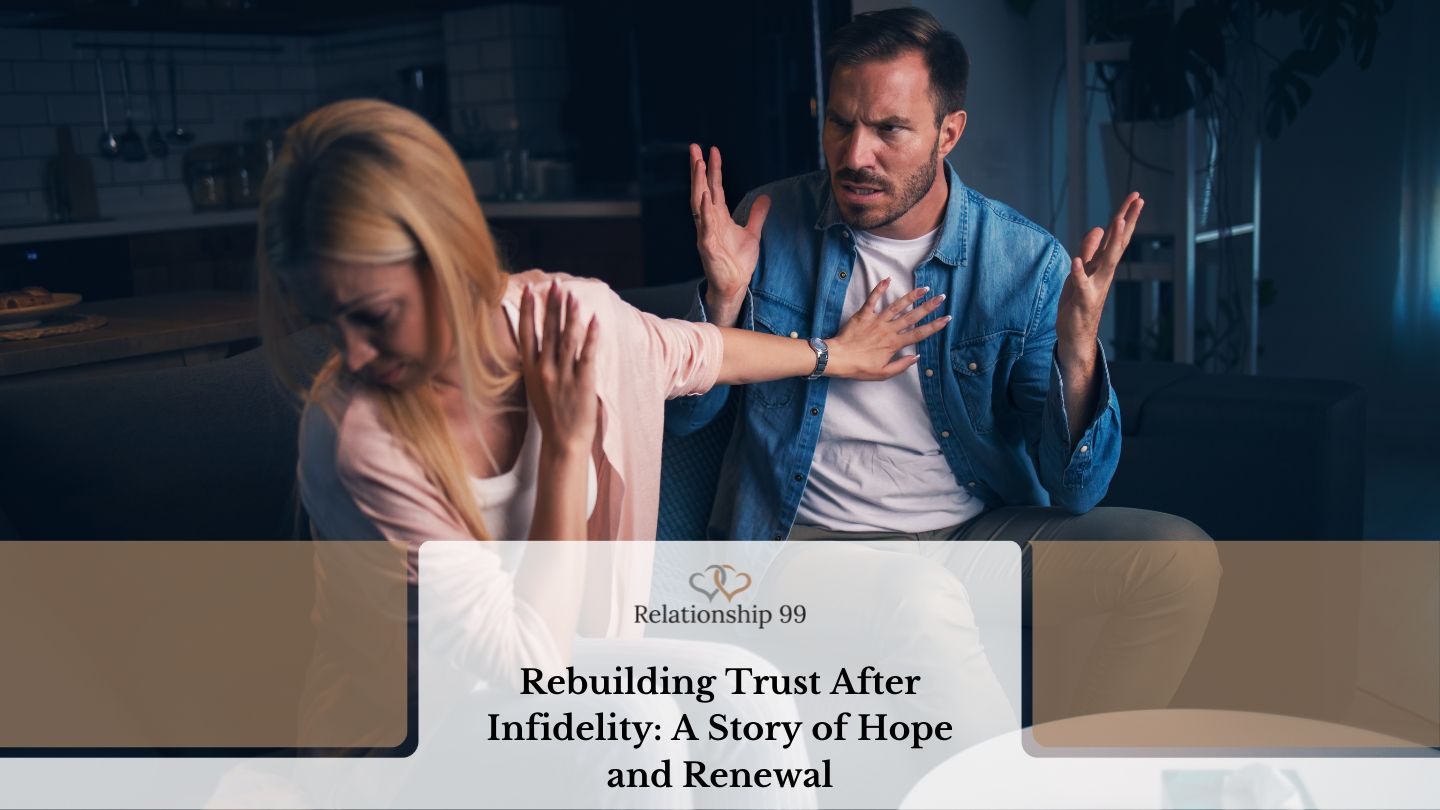Infidelity is a painful experience that can shatter trust and destroy relationships. When one partner cheats on the other, it can leave the betrayed partner feeling hurt, betrayed, and unsure of whether they can ever trust their partner again. The pain of infidelity is often deep and long-lasting, and it can take a significant toll on both individuals involved.
Acknowledging the hurt and pain caused by infidelity is the first step towards rebuilding trust. It is important for both partners to recognize the impact of the betrayal and to validate each other’s feelings. This process can be difficult and emotional, but it is necessary in order to move forward and heal.
Acknowledging the Hurt: The First Step to Rebuilding Trust
When infidelity occurs in a relationship, the betrayed partner often experiences a wide range of emotions, including anger, sadness, and betrayal. It is important for the unfaithful partner to acknowledge and validate these feelings, rather than dismissing or minimizing them. By listening to their partner’s pain and offering support, the unfaithful partner can begin to rebuild trust.
Expressing emotions and working through the pain is crucial for both partners. The betrayed partner needs to feel heard and understood, while the unfaithful partner needs to take responsibility for their actions and show genuine remorse. This process can be challenging, as it requires both partners to confront difficult emotions and face the reality of what has happened. However, by acknowledging the hurt and working through it together, couples can begin to rebuild trust.

Taking Responsibility: The Role of the Unfaithful Partner
In order to rebuild trust after infidelity, the unfaithful partner must take responsibility for their actions. This means acknowledging the hurt they have caused their partner and accepting accountability for their behavior. It also means being willing to make amends and work towards rebuilding trust.
Taking responsibility requires more than just saying “I’m sorry.” It involves showing genuine remorse and making a commitment to change. The unfaithful partner must be willing to examine their own behavior and identify the underlying issues that led to the infidelity. This may involve seeking individual therapy or counseling to address any personal issues or patterns of behavior that contributed to the betrayal.
Understanding the Root Causes: Addressing Underlying Issues
Infidelity is often a symptom of deeper issues in the relationship. It is important for both partners to understand and address these underlying issues in order to rebuild trust. This may involve exploring issues such as communication problems, unresolved conflicts, or unmet needs within the relationship.
By identifying and addressing these underlying issues, couples can work towards creating a healthier and more fulfilling relationship. This may involve seeking couples therapy or counseling to help facilitate open and honest communication, as well as provide tools and strategies for rebuilding trust.
Seeking Professional Help: The Benefits of Couples Therapy
Couples therapy can be a valuable resource for couples who are trying to rebuild trust after infidelity. A therapist can provide a safe and neutral space for both partners to express their feelings, work through their emotions, and learn new ways of communicating with each other.
In couples therapy, the therapist can help facilitate open and honest communication between partners. They can also provide tools and strategies for rebuilding trust, such as setting clear boundaries, establishing healthy communication patterns, and practicing forgiveness.
Couples therapy can also help couples explore the underlying issues that contributed to the infidelity. By addressing these issues, couples can gain a better understanding of themselves and each other, and work towards creating a stronger and more fulfilling relationship.

Rebuilding Communication: Learning to Listen and Communicate Effectively
Communication is key to rebuilding trust after infidelity. Both partners need to learn how to listen to each other’s needs, express their own feelings, and communicate effectively.
Learning to listen involves being present and fully engaged in the conversation. It means putting aside distractions and truly hearing what the other person is saying. It also means being open to feedback and willing to make changes based on the needs and concerns of your partner.
Effective communication also involves expressing your own feelings and needs in a clear and respectful manner. It means using “I” statements to express how you feel, rather than blaming or criticizing your partner. It also means being willing to compromise and find solutions that work for both partners.
Establishing Boundaries: Setting Clear Expectations
Boundaries are an important part of rebuilding trust after infidelity. They help establish clear expectations and guidelines for behavior within the relationship.
Setting boundaries involves discussing and agreeing upon what is acceptable and unacceptable behavior within the relationship. This may include things like setting limits on contact with the person the unfaithful partner had an affair with, or establishing guidelines for transparency and honesty.
Clear expectations need to be set and respected by both partners. This means being willing to communicate openly about needs and concerns, as well as being willing to make compromises and adjustments when necessary.

Practicing Forgiveness: Moving Forward with Compassion
Forgiveness is a process that takes time, and it is an essential part of rebuilding trust after infidelity. It involves letting go of resentment and anger, and moving forward with compassion and empathy towards each other.
Practicing forgiveness does not mean forgetting or condoning the infidelity. It means acknowledging the hurt that was caused, but choosing to let go of the negative emotions associated with it. It means making a conscious decision to move forward and rebuild trust, rather than dwelling on past mistakes.
Forgiveness is a personal journey, and it may take time for both partners to fully forgive and heal. It is important for both partners to be patient with each other during this process, and to offer support and understanding.
Rebuilding Intimacy: Rediscovering Physical and Emotional Connection
Rebuilding intimacy is an important part of rebuilding trust after infidelity. It involves both physical and emotional connection between partners.
Physical intimacy can be rebuilt by gradually reintroducing physical touch and affection into the relationship. This may involve starting with small gestures, such as holding hands or hugging, and gradually working towards more intimate acts.
Emotional intimacy can be rebuilt by creating a safe and supportive environment for open and honest communication. This may involve sharing feelings, fears, and desires with each other, and being willing to listen and support each other without judgment.
Rebuilding intimacy takes time and effort, but it is an essential part of rebuilding trust and creating a stronger, healthier relationship.

Maintaining Accountability: Staying Committed to Rebuilding Trust
Rebuilding trust is an ongoing process that requires both partners to stay committed and accountable. It is important for both partners to continue working on themselves and the relationship, even after trust has been rebuilt.
Maintaining accountability involves being honest and transparent with each other, as well as being willing to address any issues or concerns that arise. It means taking responsibility for your actions and making a commitment to continue growing and improving as individuals and as a couple.
It is also important for both partners to be patient with each other during this process. Rebuilding trust takes time, and there may be setbacks along the way. It is important to remember that healing is a journey, and to stay committed to the process.
A Story of Hope and Renewal
Rebuilding trust after infidelity is possible. With hard work, commitment, and the support of a therapist or counselor, couples can move forward from the pain of infidelity and create a stronger, healthier relationship.
By acknowledging the hurt caused by infidelity, taking responsibility for their actions, addressing underlying issues, seeking professional help, rebuilding communication, establishing boundaries, practicing forgiveness, rebuilding intimacy, and maintaining accountability, couples can rebuild trust and create a new foundation for their relationship.
While the journey may be challenging, it is important to remember that healing is possible. With time, effort, and a commitment to growth and change, couples can move forward from the pain of infidelity and create a future filled with hope and renewal.

